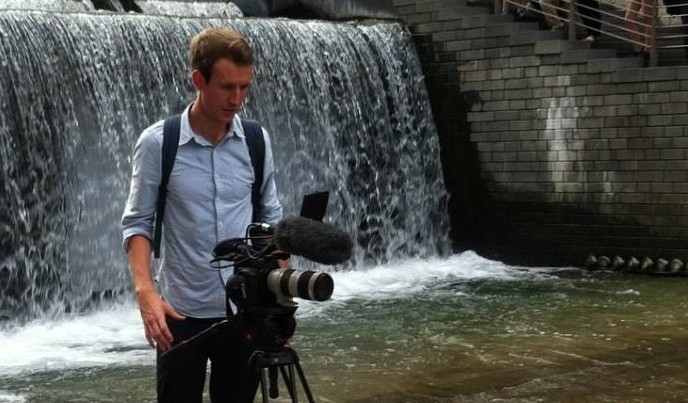James Jones, award-winning documentary-maker, held his third guest lecture at Kingston University in mid October. The 32-year-old just won an Emmy for his latest film Battle for Ukraine (PBS) and has for the last five years become one of Britain’s most renowned young international producers.
During the lecture, he discussed ethical and practical challenges of filming in some of the worlds most dangerous places. All his films can be seen on his website www.jamesjones.tv.
1. What would you say your greatest achievement is so far?
Definitely winning the Emmy. And it is weird because that was genuinely unexpected. It was a film that was thrown together, very quickly, whereas most of my films are carefully crafted over a long period. But it’s very rewarding that the film got recognised.
2. What is your biggest inspiration?
There is this film that I saw quite early on called Saving Africa’s Children. In Nigeria witchcraft is a big part of life. Even people who are Christians still believe in it. When something bad happens in the family, they’ll decide that it is a child’s fault. So then that means that that child is a witch or a wizzard. So in this film, there is a mother who has to give up her two children to an orphanage because every time she goes back to the village they chase her away with a machete saying “we’re not having these children back in.” But, eventually the mother managed to cut a deal with the villagers, so that the younger child, the baby, can come back with her.
And then when the credit is rolling in the end, there is this scene where the mother has come to collect the baby. She is walking down this kind of dirt track with the baby, and then the other child, who is about three or four years old and is being left behind, is just walking behind her, crying and screaming “mommy, mommy”. That is the film that made me decide “that’s exactly what I want to do”, “I want to make films”.
3. What do you like to do in your free time?
Go to the cinema and watch football.
4. What is your motto?
Pay attention to detail.
5. What country would you most like to live in?
New York, so America.
6. What would you say is the hardest part of being in the industry?
Starting out. With it being a freelance industry, getting a steady job that has prospects is hard. And then when you find a job, not being taken advantage of.
7. What advice would you give to aspiring journalists?
Do your own thing as much as possible. Whether that is writing on a blog, filming and editing, or whatever. Technology means that it is all so doable, so just do it. I didn’t do that myself, I was hopeless at that. But now it is more expected because the possibility is there. It’s all about commitment and confidence.
8. Who do you look up to in the industry?
There is a lot of people, but mostly filmmakers that make films that have an impact. There a woman, Amy Ziering, who made the film The Invisible War, which is about sexual assaults in the American military. It’s not perfectly made, but she uses the facts so well. And then there is like an end card, when the film ends saying “Secretary of Defence Leon Panetta watched this film on April 9 and on April 11 he changed the law”. I like films that make me angry and of my biggest fears is that the stuff we make doesn’t have an impact. But seeing films like that is obviously inspiring.
9. What one item would you take to a desert island?
A TV with Netflix on it.
10. What are your future plans?
I’m going to keep on making films. Bigger and better films. And getting better at it.

